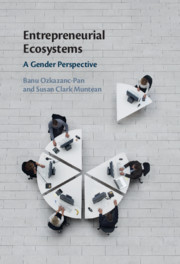Book contents
- Entrepreneurial Ecosystems
- Entrepreneurial Ecosystems
- Copyright page
- Contents
- Tables
- Preface
- 1 Introduction
- 2 Entrepreneurial Ecosystems
- 3 Understanding Gender and Inclusion in Entrepreneurial Ecosystems
- 4 Individual-Level Dynamics
- 5 Organizational-Level Dynamics
- 6 Gendering Institutions and Institutional Analysis
- 7 Intersectional Analysis
- 8 Holistic Solutions for Inclusive Economic Development through Entrepreneurship
- Index
- References
5 - Organizational-Level Dynamics
Practices and Policies
Published online by Cambridge University Press: 20 October 2021
- Entrepreneurial Ecosystems
- Entrepreneurial Ecosystems
- Copyright page
- Contents
- Tables
- Preface
- 1 Introduction
- 2 Entrepreneurial Ecosystems
- 3 Understanding Gender and Inclusion in Entrepreneurial Ecosystems
- 4 Individual-Level Dynamics
- 5 Organizational-Level Dynamics
- 6 Gendering Institutions and Institutional Analysis
- 7 Intersectional Analysis
- 8 Holistic Solutions for Inclusive Economic Development through Entrepreneurship
- Index
- References
Summary
This chapter shares examples of organization-level barriers to full participation of women in entrepreneurial ecosystems by way of the three cities that were the sites of our fieldwork—Boston, Massachusetts, St. Louis, Missouri, and Asheville, North Carolina. Here, the focus is on the ways in which intermediary organizations, such as incubators, accelerators, coworking spaces, and investors among others, can act as gatekeepers to the resources of the ecosystem. The chapter focuses specifically on access to networks, outreach, selection, support mechanisms (i.e., entrepreneur support organizations) available in the ecosystem, and ecosystem culture. In speaking to these issues, the chapter focuses on the role of meso-level organizational actors and how their norms, values, and practices differentially impact entrepreneurs and lead to inclusion or exclusion from the ecosystem.
- Type
- Chapter
- Information
- Entrepreneurial EcosystemsA Gender Perspective, pp. 141 - 160Publisher: Cambridge University PressPrint publication year: 2021



